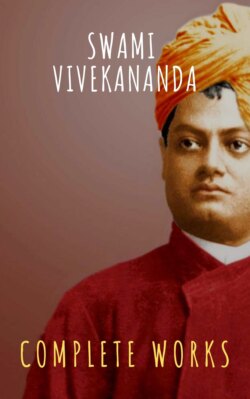Читать книгу Complete Works of Swami Vivekananda - Swami Vivekananda - Страница 103
На сайте Литреса книга снята с продажи.
Swami Vivekananda On India
Оглавление(Bay City Daily Tribune, March 21, 1894)
Bay City had a distinguished visitor yesterday in the person of Swami Vive Kananda, the much talked of Hindoo monk. He arrived at noon from Detroit where he has been the guest of Senator Palmer and proceeded immediately to the Fraser house. There he was seen by a reporter for The Tribune.
Kananda spoke entertainingly of his country and his impressions of this country. He came to America via the Pacific and will return via the Atlantic. “This is a great land,” he said, “but I wouldn’t like to live here. Americans think too much of money. They give it preference over everything else. Your people have much to learn. When your nation is as old as ours you will be wiser. I like Chicago very much and Detroit is a nice place.”
Asked how long he intended remaining in America, he replied: “I do not know. I am trying to see most of your country. I go east next and will spend some time at Boston and New York. I have visited Boston but not to stay. When I have seen America I shall go to Europe. I am very anxious to visit Europe. I have never been there.”
Concerning himself the easterner said he was 30 years old. He was born at Calcutta and educated at a college in that city. His profession calls him to all parts of the country, and he is at all times the guest of the nation.
India has a population of 285,000,000,” he said. “Of these about 65,000,000 are Mohammedans and most of the others Hindoos. There are only about 600,000 Christians in the country, and of these at least 250,000 are Catholics. Our people do not, as a rule, embrace Christianity; they are satisfied with their own religion. Some go into Christianity for mercenary motives. They are free to do as they wish. We say let everybody have his own faith. We are a cunning nation. We do not believe in bloodshed. There are wicked men in our country and they are in the majority, same as in your country. It is unreasonable to expect people to be angels.”
Vive Kananda will lecture in Saginaw to-night
LECTURE LAST NIGHT
The lower floor of the opera house was comfortably filled when the lecture began last evening. Promptly at 8:15 o’clock Swami Vive Kananda made his appearance on the stage, dressed in his beautiful oriental costume. He was introduced in a few words by Dr. C. T. Newkirk.
The first part of the discourse consisted of an explanation of the different religions of India and of the theory of transmigration of souls. In connection with the latter, the speaker said it was on the same basis as the theory of conservation was to the scientist. This latter theory, he said, was first produced by a philosopher of his country. They did not believe in a creation. A creation implied making something out of nothing. That was impossible. There was no beginning of creation, just as there was no beginning of time. God and creation are as two lines — without end, without beginning, without [?] parallel. Their theory of creation is, “It is, was, and is to be.” They think all punishment is but re-action. If we put our hand in the fire it is burned. That is the re-action of the action. The future condition of life is determined by the present condition. They do not believe God punishes. “You, in this land,” said the speaker, “praise the man who does not get angry and denounce the man who does become angry. And yet thousands of people throughout this country are every day accusing God of being angry. Everybody denounces Nero, who sat and played on his instrument while Rome was burning, and yet thousands of your people are accusing God of doing the same thing today.”
The Hindoos have no theory of redemption in their religion. Christ is only to show the way. Every man and woman is a divine being, but covered as though by a screen, which their religion is trying to remove. The removal of that Christians call salvation, they, freedom. God is the creator, preserver, and destroyer of the universe.
The speaker then sought to vindicate the religions of his country. He said it had been proven that the entire system of the Roman Catholic Church had been taken from the books of Buddhism. The people of the west should learn one thing from India — toleration.
Among other subjects which he held up and overhauled were: The Christian missionaries, the zeal of the Presbyterian church and its non-toleration, the dollar-worshipping in this country, and the priests. The latter he said were in the business for the dollars there were in it, and wanted to know how long they would stay in the church if they had to depend on getting their pay from God. After speaking briefly on the Caste system in India, our civilization in the south, our general knowledge of the mind, and various other topics the speaker concluded his remarks.
